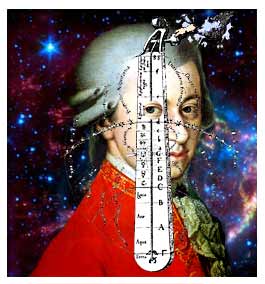Mozart and the Music of the Spheres

"That... is the music of the spheres, the melody in intervals unequal but in exact proportion, made by the movement of the spheres themselves. By blending high and low tones harmonies are produced, since such motion cannot occur without sound. The highest sphere of heaven moves most rapidly and thus produces a quick and sharp sound; the moon, moving slowest, produces the lowest sound. The earth remains stationary and silent. The eight other spheres produce seven other tones because Mercury and Venus move in unison. Seven is the key to almost everything. Wise men, imitating this harmony using string instruments and song, have discovered a way to see some of this place, as do others that apply their genius to studying the divine. But men's ears are deaf to this continuous melody; mortals have no duller sense than hearing. Like those that live near the cataracts on the Nile, the harmony of the universe is too loud to be heard; in the same way that you cannot look straight at the Sun." -Cicero (Scipio's Dream)
Readings:
There is geometry in the humming of the strings ... there is music in the spacing of the spheres.
Pythagoras & Music of the Spheres
The Music of the Spheres by Fred Hutchison
"Haydn had a student of whom Mozart said, "One day he shall make a great noise in the music world." The name of Haydn's student was Beethoven."
Beethoven was a Narcissistic Hooligan
"Mozart knew how to find or more exactly how to observe this happy balance that makes the cosmos sing and man answer, by restructuring himself at the molecular level … He knew how to adapt the eternal rhythms to our neurons" - Alfred A. Tomatis
Books:
Listening for Wellness: An Introduction to the Tomatis Method
The Ear and the Voice




0 Comments:
Post a Comment
<< Home